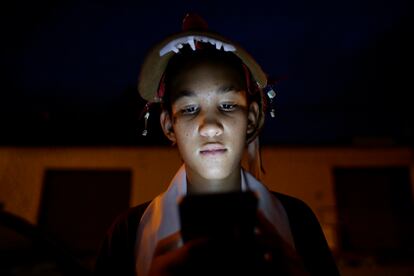Brazil creates an app to block stolen cell phones: ‘They will be a useless piece of metal’
In 2022, almost one million mobile devices were stolen, 16% more than the previous year. The government hopes that the new project will help reduce those numbers

Cell phone theft in Brazil is one of the most frequent crimes in big cities, almost a ritual that you have to go through at least once in your life. There are types for all tastes: from theft in the middle of a crowd to armed robbery, including the latest rising trend: shattering the window of a vehicle by surprise and tearing the device from its owner’s hands in milliseconds. Normally, the trauma of loss is followed by a string of painful bureaucratic efforts, and in many cases, the unpleasant surprise of finding a hole in the bank account.
The Brazilian government, through the Ministry of Justice and Public Security, has decided to take action and on Tuesday presented a project that aims to make life easier for victims and reduce robberies. It’s called Celular Seguro (Safe Cell Phone) and it’s a very simple application that will get underway this week. Users must register the cell phone number, or save the number of a trusted person who would be authorized to manage notifications from one’s cell phone. When the theft occurs, the user activates a warning button, which automatically reaches the National Telecommunications Agency (Anatel), which then renders the device inoperative. In theory this could already be done, but it was almost science fiction, as it required endless minutes on the phone talking to an automated system.
The great novelty is that now, in addition to speeding up the process, the system will also automatically notify the bank in order to block the mobile application, so thieves cannot hack into it. According to the government, banks have promised to act within a period of between 10 and 30 minutes. Virtually everyone who operates in Brazil has joined, so the coverage will be quite broad.
In the midterm, the government also hopes that the mobile telephone operators themselves will join the project, so that they can block the chip (not only the cell phone itself) and in this way prevent thieves from receiving SMS messages with which they can recover passwords, for example. Applications such as iFood, Uber, 99 and Mercado Livre, very popular in Brazil, also signed a protocol of intentions to join the program before February 9, 2024. In case the person cancels a lost cell phone that later shows up again, there will be mechanisms to make it work again.
For the executive secretary of the ministry, Ricardo Cappelli, the app has two central objectives: to speed up help for victims and to make thieves question whether stealing a cell phone is worth it. “We are building an emergency button, so that when the person activates it, operations are quickly blocked and the person can reorganize more calmly, without the agony of having to stop their life to make 300 calls […] Our goal is to transform the stolen device into a useless piece of metal,” he said at a press conference. The application, in any case, does not take the place of filing a report at the police station.
The ministry official stated that the application is the result of six months of work and based on the idea that it is better to address the problem as a whole than with palliative repressive actions that do not usually work. “It is a structural problem of Brazilian public security, and it is not easy to solve,” he said. Last year, 999,223 cell phones were stolen in Brazil, according to data from the Public Security Yearbook, which represents a rise of 16% compared to 2021. The real figure may be much higher, since the underreporting of this type of crime is very high, especially when there is no violence involved.
Sign up for our weekly newsletter to get more English-language news coverage from EL PAÍS USA Edition
Tu suscripción se está usando en otro dispositivo
¿Quieres añadir otro usuario a tu suscripción?
Si continúas leyendo en este dispositivo, no se podrá leer en el otro.
FlechaTu suscripción se está usando en otro dispositivo y solo puedes acceder a EL PAÍS desde un dispositivo a la vez.
Si quieres compartir tu cuenta, cambia tu suscripción a la modalidad Premium, así podrás añadir otro usuario. Cada uno accederá con su propia cuenta de email, lo que os permitirá personalizar vuestra experiencia en EL PAÍS.
¿Tienes una suscripción de empresa? Accede aquí para contratar más cuentas.
En el caso de no saber quién está usando tu cuenta, te recomendamos cambiar tu contraseña aquí.
Si decides continuar compartiendo tu cuenta, este mensaje se mostrará en tu dispositivo y en el de la otra persona que está usando tu cuenta de forma indefinida, afectando a tu experiencia de lectura. Puedes consultar aquí los términos y condiciones de la suscripción digital.








































